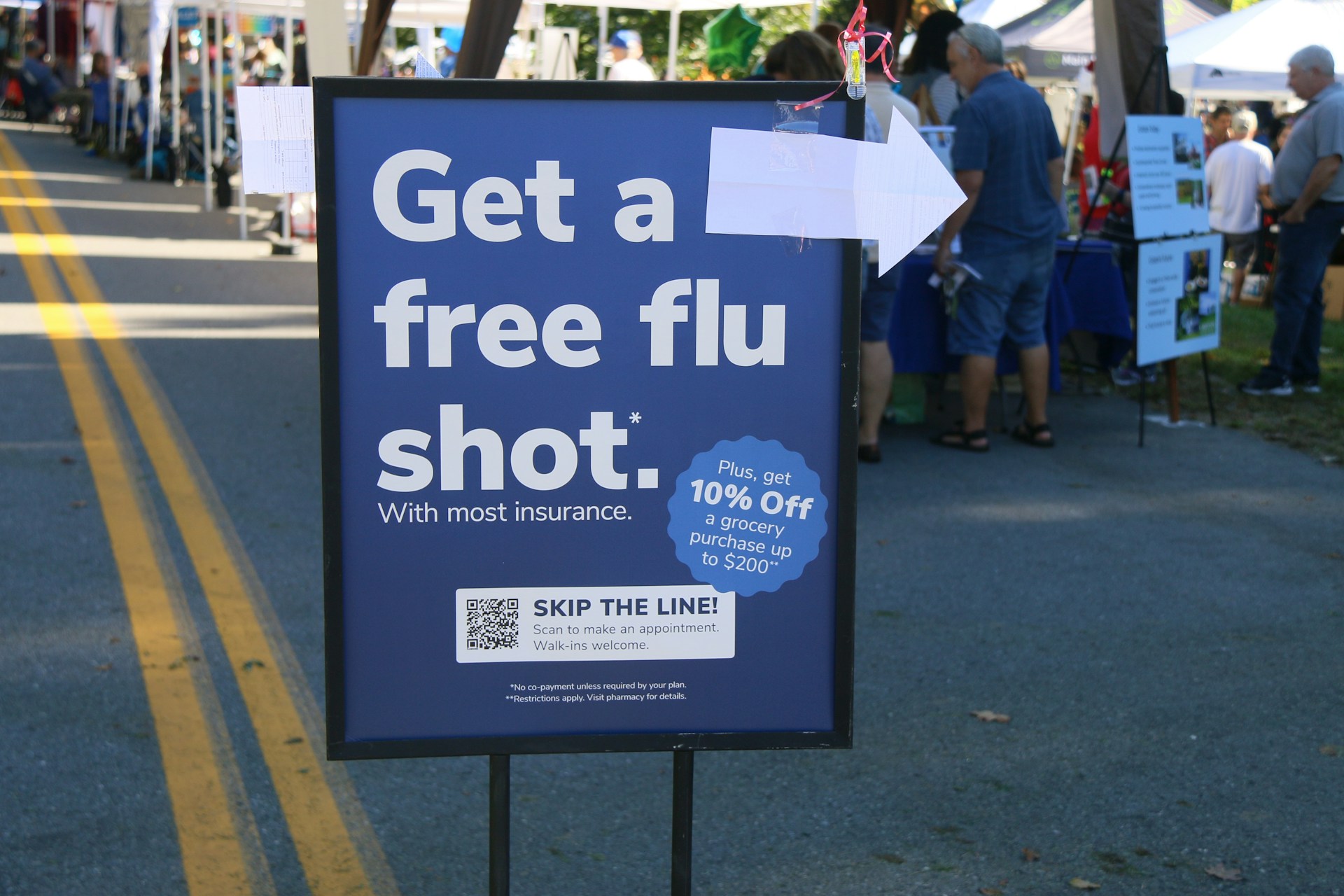Health
Do You Plan on Getting a Flu Shot This Year?

Do You Plan on Getting a Flu Shot This Year?
Here’s The Scoop
A growing number of U.S. adults are expressing hesitancy toward getting recommended vaccines this fall, according to a recent survey. The poll, which included 1,006 participants, revealed that only 43% have received or plan to receive the COVID vaccine, and just 56% are considering the flu shot.
Interestingly, 37% of those who have previously been vaccinated are planning to skip their shots this season. Furthermore, about one-third of respondents believe they don’t need vaccines for flu, COVID, RSV, or pneumococcal pneumonia.
Vaccine hesitancy appears to be more prevalent among younger adults, with those aged 65 and older being the most likely to get immunized. This nationwide survey was conducted by The Ohio State University Wexner Medical Center in mid-August 2024.
These findings come on the heels of the FDA’s approval of updated COVID-19 vaccines from Moderna and Pfizer for the 2024-2025 season. Dr. Nora Colburn, medical director of clinical epidemiology at Ohio State’s Richard M. Ross Heart Hospital, emphasized the importance of vaccinations, especially for older adults, people with chronic medical conditions, and pregnant women, as we enter respiratory virus season.
Dr. Jacob Glanville, CEO of Centivax, a San Francisco biotechnology company, noted that the 37% of people opting out of vaccines this year isn’t surprising. “We just had a vaccine mandate a couple of years ago, and childhood vaccines are very broadly administered, so those 37% are people who wouldn’t be getting a vaccine normally anyway,” he told Fox News Digital.
Glanville also pointed out that the reported 56% rate for the flu shot is slightly above average, as it usually hovers around 50%. He attributed the lower coronavirus vaccination rates to public confusion about post-pandemic treatment and fatigue from vaccines that haven’t been particularly effective at preventing symptoms, even though they do protect against severe illness.
Dr. Marc Siegel, senior medical analyst for Fox News and clinical professor of medicine at NYU Langone Medical Center, expressed concern over the poll’s findings. “Both vaccines wane over six months, so a yearly booster makes sense for high-risk groups,” he said. Siegel recommends annual boosters for the elderly, immunocompromised, and those with chronic illnesses.
Siegel also warned that the activity of the COVID virus remains high, particularly in the western U.S., and mentioned a new variant circulating in Europe, the XEC subvariant, which is expected to reach the U.S. soon.
Dr. Paul Offit, director of the Vaccine Education Center at Children’s Hospital of Philadelphia, highlighted that very young children are being hospitalized at a greater rate, likely because they haven’t been vaccinated with the primary series. He echoed the recommendation for yearly boosters for vulnerable groups and those at risk for long COVID.
The U.S. Centers for Disease Control and Prevention (CDC) has issued the following vaccine recommendations:
- Flu: Everyone 6 months and older should get vaccinated.
- COVID-19: The latest version is recommended for everyone 6 months and older.
- RSV: Recommended for everyone aged 75 and older, those aged 60 to 74 with chronic medical conditions, and pregnant women during weeks 32 through 36 of pregnancy.
- Pneumococcal: Recommended for everyone younger than 5 years and those 65 and older, along with individuals at increased risk of severe disease.
What do you think? Let us know by participating in our poll, or join the discussion in the comment section below!

Cheryl Gregg
September 20, 2024 at 8:37 am
I am up to date on my covid vaccine, but the only time I got a flu vaccine, I was sicker than I’ve ever been, so no thanks on that one
Sarah
September 21, 2024 at 3:18 pm
It is safer to not participate in vaccines. But that said, you cannot just sit there and hope you don’t get sick. Suplements, exercise, practicing good awareness of the truth, and of course, my desire to trust in Jesus for all things as He loves us all.
Nancy Janzen
September 27, 2024 at 2:26 pm
I dont trust either shot.i am not able to take the Covid shot due to a history of blood clots and after Covid I dont trust the flu shots either.
Tim Kuehl
September 21, 2024 at 9:02 am
NEVER trust the CDC nor the NIH. They proved during COVID they cannot be trusted. And neither can the WHO which is a UN organization and even less trustworthy.
TheProAmericanGuy
September 21, 2024 at 2:31 pm
Imagine that! On a site named “Liberty Surveys” they have anti-American censorship in the comments section.
Richard Chase
September 23, 2024 at 8:11 am
I got the original Covid vaccine shot and evert recommended booster, an have successfully navigated through the course of the pandemic without contracting the disease despite multiple direct exposers to it from actively affected patients. QED: It safely works. My biological academic training gave me confidence to ignore the many uneducated statements about the alleged dangers of trying this alleged new and dangerous way of developing a vaccine, and to see through the gross inaccuracies of the alleged dangers of using it.
Mike D
September 27, 2024 at 8:50 am
Lol I know several people (including the current “president” that’s had every shot of poison and still get it.
Ralph Tiegmeyer
September 27, 2024 at 9:08 am
How many genders are there? Did your education teach you that? So, 6’ distance wasn’t bull? Does the general public wear masks correctly?
Nancy Janzen
September 27, 2024 at 2:29 pm
I didnt get the disease either despite living with someone who got it multiple times. And I didnt get the shots either because it was contra indicated for me due to a history of blood clots.
CandygramForMongo
September 28, 2024 at 7:18 am
Enjoy the cancers you will eventually get from the clot shot and the flu shot!
Shuggie Silva
September 27, 2024 at 7:31 am
73, never gotten a flu shot, never taken an experimental gene therapy masquerading as a vaccine either. After the scam of the last 4 years, I’ll never trust the medical/media/government cabal again.
Old Patriot
September 27, 2024 at 7:54 am
Have to agree with you.
Old Patriot
September 27, 2024 at 7:53 am
As I do not want heart problems, I will never get a mRNA shot. Too many healthy people have “died suddenly” after getting them.
Richard
September 27, 2024 at 8:37 am
I am eighty years old and have had two flu shots in my life. Both times I got very bad cases of flu. I have never had it again since not getting the shots. My wife was double vaccinated against Covid she got it and brought it home to me. She was far sicker than I was.
Mike
September 27, 2024 at 8:48 am
I’m 56 and never had and never will get a flu shot
CandygramForMongo
September 28, 2024 at 7:20 am
That makes you SMART!!!!
Steve Gibson
September 27, 2024 at 10:14 am
I’m 74yo never had flu shot nor the flue. My wife several years ago got a flu shot and was sick as a dog, never again & she’s fine, never had the flu since.
I’ll never accept any of that poison that’s ineffective and can cause harm. I’ll stay away from all vaccines too. Pfizer/Moderna have zero liability & I don’t trust the FDA either. They parroted the phrase, “Safe & Effective” which was an absolute lie!
Jerry C.
September 27, 2024 at 6:25 pm
I’m almost 60 and have never had a flu shot nor a pneumonia shot. That’s not to say I’m one of those anti-vax m0r0ns, just that I’ve never seen a personal need for those 2: since I quit smoking back in ’03 I rarely get sick, anymore.
I got the J&J Covid19 vaccine as soon as possible, zero side effects (and I’ve already got a bum ticker & pacemaker). I had Covid once before the shot & once after (Delta). I never bothered with a booster, ‘though I might get the traditional one. No mRNA vaccines for me, though: I don’t entirely buy the science behind them and will wait for more data before I decide to try one. Will likely get a shingles vaccine, soon, (have a relative who got shingles younger than me & it ain’t fun nor pretty!) If I get much older I might start getting annual flu & pneumonia shots but, then again, I might just be too forgetful or too lazy to bother…
Randy Mr. Race
September 27, 2024 at 7:09 pm
I never got the shot!!!!!!!!!! my wife had the covid mildly. We still slept together and I never got it. go to hell CDC!!!
Duke Larsen
September 30, 2024 at 3:46 pm
No and No. why would a sane person wish to make themselves sicker and hasten their death.
Walter W. Hedge
October 22, 2024 at 2:15 pm
I knew one MAGA cult member who didn’t get a covid shot and died. I have read about several others, including conservative talk show host Phil Valentine, that weren’t vaccinated and died.
The more MAGA cult members that die, the faster the GOP will become great again.
Irishgal
October 24, 2024 at 3:06 am
Got Instagram? Look up Covid.bc—-thousands of deaths posted relating to the jab. Good luck to those who did fall for and took the jabs.